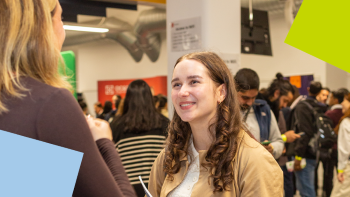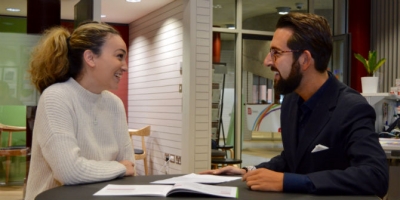For some, this may be a time of uncertainty around career options and opportunities, making applications, or perhaps how you’ll fit into a new company and team that’s currently operating online.
With this in mind, as part of our summer careers offer: Your future, your way, LSE Careers spoke with several employers to get their top tips and insights, as well as their thoughts on some of the more common myths we hear.
This blog covers’ employers’ top tips and strategies on how students can stand out to their employers as an applicant with the following questions:
- Some students may have been unable to secure an internship resulting in a gap in their CV. How should they communicate this in their CV or cover letter?
- How can students best communicate their understanding of your company’s values and their cultural fit?
- How should students highlight their commercial awareness and detailed understanding of your business?
- Lots of students have been gaining new skills and experience through online learning platforms and training courses. How is this experience best presented on a CV or cover letter?
- What are the top 3 technical skills you look for in an applicant?
- What are the top 3 personal attributes you look for in an applicant?
- Please give your thoughts on these popular myths
Some students may have been unable to secure an internship resulting in a gap in their CV. How should they communicate this in their CV or cover letter?
Natalie Luyt, Analyst at Economic Insight & Anthony Zhang, Consultant at Economic Insight
- Arguably, the most important factor is to be motivated for working in the industry, and our company. Communicating this through your cover letter is worthwhile (e.g., any research you have done, any events and panels you have attended, etc). In terms of substantive material that substitutes work experience however, I would suggest that any extra-curricular activities that you have participated in before or currently (e.g., societies, projects alongside university work, etc. all serve as valuable experience in some shape or form).
Rebecca McEwan, Senior Entry Level Recruitment Manager, Oliver Wyman*
- Firstly, try not to worry. It is easy to lose confidence from this but don’t worry. Particularly in virtual environments, employers know how difficult it can be to secure internships / permanent roles. If you don’t have an internship this Summer, try and still have a productive Summer, whether that be an online course or some voluntary / other employment that you can secure. This will avoid any perceived ‘gap’ and then you can address the transferrable skills in your cover letter. If your internship was cancelled because of Covid, then definitely cite this in your cover letter.
For more insights, tips and an opportunity to ask questions, join the Senior Recruitment Manager from Oliver Wyman for an online session Thursday 8 October 1pm – Register HERE
Katherine McAteer, Recruitment Advisor, ROPES & GRAY
- I think employers are very sympathetic to students’ experience throughout the pandemic, so don’t be afraid to have gaps in your CV but be prepared to talk about the experience and what you learned from this time away from work. Did you take up a new hobby or interest?
Michelle Costello, Talent Acquisition Coordinator, Charles River Associates
- Employers are aware of this, and we understand that it was a tough market during Covid-19. If students had an internship offer rescinded, I would advise them to include that on their resume. It is helpful to know that a student obtained an internship, even if they couldn’t complete it.
How can students best communicate their understanding of your company’s values and their cultural fit?
Natalie Luyt, Analyst at Economic Insight & Anthony Zhang, Consultant at Economic Insight
- Values and cultural fit between companies are generally difficult to gauge without meeting employees and talking to them. In addition, as company culture will often differ greatly within economic consulting, it is important that students get a sense for what it might be like to work for the company they apply to. Attending careers events and company presentations will therefore be the key routes to learning about values and cultural fit. Students can communicate these learnings, and why it motivates them, through their cover letter.
Jenna Luca, Campus Recruiting associate, Huron Consulting Group
- Review the website and do your research prior to an interview.
- When asked about your interest in the company, tie in company values that align with your own.
Tashima Dally, Talent Acquisition Specialist, Cornerstone Research
- This can be best communicated in the interview stage when speaking to “Why Cornerstone Research?” Our core values can be found here.
IBM Watson Health Consultant, IBM Government Health and Human Services
- I’d say by doing their research thoroughly and giving examples of the company’s values and how they fit it personally by real-world examples. Show how your own personal values align with the company’s.
How should students highlight their commercial awareness and detailed understanding of your business?
Natalie Luyt, Analyst at Economic Insight & Anthony Zhang, Consultant at Economic Insight
- There are generally two routes to this: (i) online research, and (ii) attending careers events and meeting us in person! Within economic consultancy, there are various areas of focus (e.g., competition, regulation, public policy). Consultancies will often do different types of work, and therefore have different types of clients. For example, as a firm, we work across all the practices above, though many consultancies will specialise in one area. There also may be individual projects that you have read or heard of that interest you, that you may want to communicate in a cover letter.
Tashima Dally, Talent Acquisition Specialist, Cornerstone Research
- Students should express interest and awareness of what Cornerstone does in their cover letter. This is also important to communicate “Why Cornerstone Research?” should you get to first and final round interviews.
Michelle Costello, Talent Acquisition Coordinator, Charles River Associates
- It always shows when a candidate has done their research on a company. During the interview, candidates could reference company articles or work that the company has done that they are aware of. If they have joined any events, let the interviewer know what they learnt at that event. Showing that you have a good understanding of the work they do will show that you know what will be expected of you when you join.
IBM Watson Health Consultant, IBM Government Health and Human Services
- By giving examples of things they have read about/business cases that are current, as well as detailing how they understand the business and any recent initiatives they have read about and are enthused by.
Make sure to learn more about your specific sectors and industries before you begin your job search to help you prepare and plan for your career.
Lots of students have been gaining new skills and experience through online learning platforms and training courses. How is this experience best presented on a CV or cover letter?
Natalie Luyt, Analyst at Economic Insight & Anthony Zhang, Consultant at Economic Insight
- There is no real set criteria, or process, for communicating these skills and experience. Nevertheless, students should aim to include them in their CV, and communicate this in their cover letter if they think it is relevant. In the latter, it is often useful to think about your motivation for gaining the new skill/experience, what you learned from it, and how this contributes to your desire to work in the industry.
Jenna Luca, Campus Recruiting associate, Huron Consulting Group
- I would recommend adding a skills section on your CV to reflect this area (short bullets work great). If there is a cover letter component to the application, I would add a few sentences to describe these skills related to the role.
Michelle Costello, Talent Acquisition Coordinator, Charles River Associates
- List all certificates, credentials, and level of experience on your resume as it shows your motivation to learn. In your cover letter, you could highlight a course that you enjoyed on how it will enable you to bring more to the position that you are applying for.
IBM Watson Health Consultant, IBM Government Health and Human Services
- I think by explaining in their cover letter that during the pandemic they have done this online learning and demonstrating how they have used it in practice. Also listing on their CV is a good idea.
LSE Careers offers a plethora of resources (e.g., Career Set) and information to help you write an effective CV/resume, cover letters, and application forms.
What are the top 3 technical skills you look for in an applicant?
Natalie Luyt, Analyst at Economic Insight & Anthony Zhang, Consultant at Economic Insight
- We generally do not require specific technical skills prior to joining. The only material skill we look for is a strong grasp in microeconomics. This is as our line of work is based on solving economic problems on the firm, and industry-level. Therefore, being able to think about and apply economic concepts to the real world is important to succeeding in the job.
Tashima Dally, Talent Acquisition Specialist, Cornerstone Research
- Technical skills are less important at Cornerstone Research as we do provide extensive training. Taking finance and economic courses and performing well in them is important.
LSE offers a lot of a wide array of skills and language development courses. For instance, LSE Digital Skills lab offers technical courses such as web design, Microsoft Office certifications, and data science tools, etc.
What are the top 3 personal attributes you look for in an applicant?
Tashima Dally, Talent Acquisition Specialist, Cornerstone Research
- Organized, Adaptability, Initiative
Please give your thoughts on these popular myths:
“All the applications are assessed by an algorithm and nobody even reads them!”
Natalie Luyt, Analyst at Economic Insight & Anthony Zhang, Consultant at Economic Insight
- We read through CV’s and cover letters for every applicant. Even though we have a large volume of applications, it is important that we hire those that put care into their cover letters, as this is often the factors that distinguishes an average application from ones that stand out.
Jenna Luca, Campus Recruiting associate, Huron Consulting Group
- This is a myth! We review every application we receive. Resume layout and details are very important to demonstrate your skills.
Tashima Dally, Talent Acquisition Specialist, Cornerstone Research
- Cornerstone Research applications are hand reviewed by our Talent Acquisition Team. The cover letter in particular is an extremely important component.
Michelle Costello, Talent Acquisition Coordinator, Charles River Associate
- This is untrue. CRA reviews every application submitted.
“You need to have completed an internship to be considered for a graduate role.”
Natalie Luyt, Analyst at Economic Insight & Anthony Zhang, Consultant at Economic Insight
- Internships are not required for you to be considered for a graduate role.
Jenna Luca, Campus Recruiting associate, Huron Consulting Group
- While internships help students to find a field of interest and demonstrate their skills, being involved in school clubs and activities that are related to your desired job field is also important.
Tashima Dally, Talent Acquisition Specialist, Cornerstone Research
- This is not true, especially as many internship opportunities were reduced in the past year and a half given the pandemic. Internships are encouraged, however having other extracurricular activities on your CV is important as well.
Michelle Costello, Talent Acquisition Coordinator, Charles River Associate
- Untrue. We will still consider candidates if they don’t have an internship.
“I have no formal work experience, so I won’t be considered for a graduate role.”
Natalie Luyt, Analyst at Economic Insight & Anthony Zhang, Consultant at Economic Insight
- As with internships, formal work experience is not required to be considered for a graduate role. While any work experience, where relevant, may strengthen your application, it is not a prerequisite.
Michelle Costello, Talent Acquisition Coordinator, Charles River Associate
- Untrue. We consider candidates with no formal work experience. We will look at other factors, such as classes taken, volunteering, certificates, GPA etc. Cornerstone Research considers all types of candidates with various experience.
“I’m an international student so there’s no point in me applying as I need visa sponsorship”
Natalie Luyt, Analyst at Economic Insight & Anthony Zhang, Consultant at Economic Insight
We have, and aim to hire the best graduates, regardless of citizenship. We have sponsored student visas in the past and will continue to do so if you are successful in the application process.
“I need to be able to code”
Natalie Luyt, Analyst at Economic Insight & Anthony Zhang, Consultant at Economic Insight
It is not necessary to know how to use any coding software in economic consulting, prior to starting. We have internal training seminars in place to teach you how to use Stata, as well as other packages such as R and mapping software. We much prefer the ability to think about economic problems over the technical ability to perform it. The latter is something you master on the job. At the same time, there is nothing to lose for those that know how to code or would like to learn it before starting, as it will help you to progress up the learning curve when joining.
This is the first part of a two-part blog series from our summer careers offer: Your future, your way. The second part covers employers’ insights on how students can stand out within the workplace and make the most of their time.
Find out more about Your future, your way events and workshops on CareerHub, and don’t hesitate to book a confidential one-to-one careers appointment to discuss any of the above topics or other career-related questions you may have.





